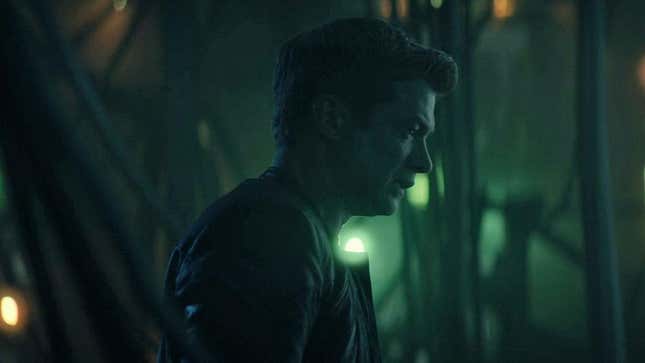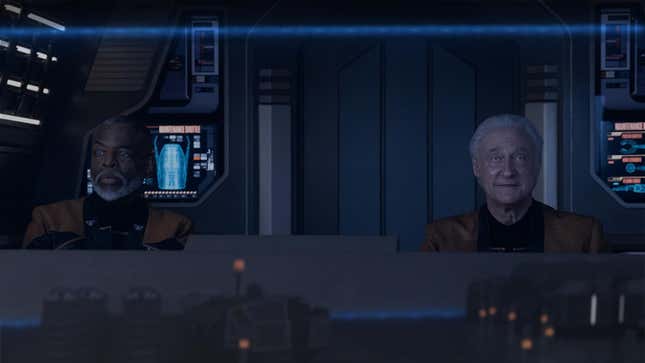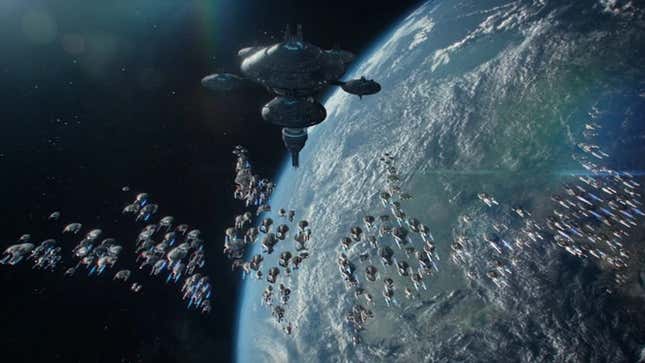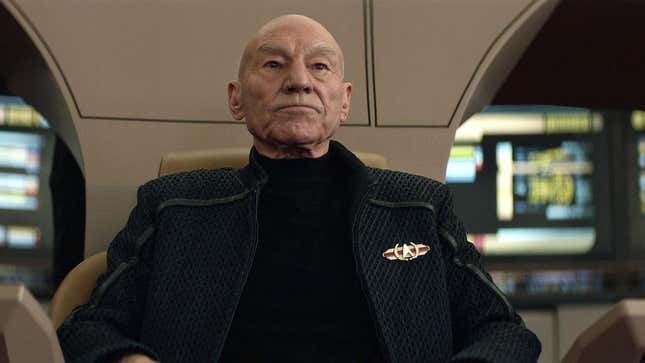Star Trek: Picard has felt very different in its final season to either the spartan, melancholy tone of its first, or the balls-to-the-wall wildness of its second. But as it prepares for one last hurrah with the TNG crew in its penultimate episode, it has borrowed a little bit of that energy of season two to prepare for what will be its ultimate battle: a tale of the old saving the new.
The Woman Who Would Be Photon

“Võx,” a title whose meaning we will get to soon enough, kicks up the scale of Picard’s final season with not a moment to spare, realizing that after last week’s surprising clearing of the board when it came to Vadic, the thrust of much of the season so far, things actually need to start feeling like a season finale. And what would a season finale of such a nostalgic season of such a nostalgic show be without another familiar foe emerging from the shadows?
Because that is indeed what we get right into: Vadic’s rogue Changeling faction wasn’t working alone, as we learn when Deanna Troi gets her best Betazed on and dives deep into the plagued mind of Jack Crusher. Exploring his trauamatic visions and a life yearning for connection in a sea of isolation, Deanna and Jack alike undergo a terrifying discovery. What the changelings want from the son of Jean-Luc Picard is that he is not just the son of Jean-Luc Picard, but also Locutus of Borg. And if Locutus is the one who speaks for the Borg… what of a voice descending from that speaker? And what of the Borg themselves?

Yes indeed, the mysteries of the red door in Jack’s mind, his eerie abilities to connect to others and act through them, these vines and tendrils worming through his mind are revealed as none other than the work of the Borg Collective—because Jean-Luc passed on so much more to his son, the re-written DNA of his father’s time with the Borg existing in him, the literal sins of the father now alive and well, and ready for a combined operation between the Borg and the Changelings to strike out at the Federation that sundered them both.
As a cube emerges and the voice of the Queen herself—the returning Alice Krige in a chilling voice cameo, although one marred with a twinge of sadness after the passing of season two‘s Annie Wersching, who embodied the Borg Queen to stunning effect—goads Jack into seeking out the truth of his existence, Picard begins to show its bonkers hand a little. This is a whole lot to come out of relatively little in the final hours of the show, and it’s something that really doesn’t want you to sit and dwell on it for too long, given the equally bonkers stuff that happened with the Borg, and was almost immediately dropped, at the climax of season two. But even as Picard just begs you to enjoy the surprise and the nostalgia, there is yet some dramatic merit here that sells you on it beyond the shock and spectacle, and it’s thanks to stunning turns from Ed Speelers, Patrick Stewart, and Gates McFadden.

All season long Jack has had to grapple with reuniting with his father, and seeing what parts of the man he has become are cut from the same cloth as the legendary Captain Picard. It’s cut through here in a bracing, almost venemous line—“How much of me is me?”—and it’s not just Jack who hurts at all these revelations, as Picard himself has to deal with the grief that he, somehow, has given what he feels is the worst of himself to his own son, no matter how much he can control that. For Beverly herself, who sacrificed so much of her life and her connections to the people she loved to protect Jack from his legacy, all that has come for naught as the things she feared most for him haven’t just come to pass, but were inevitable, a grief that strikes her particularly. This is the kind of grounding to the rose-tinted dazzling light of nostalgia that Picard’s third season has, by and large, handled deftly.
What’s handled… shall we say a little less deftly, is the reveal of what Picard has been building to with the Changeling’s (and now Borg’s) plans for season three. In sacrificing personal stakes for the grander ones a season, and series, finale requires, its here that “Võx” perhaps flies a little too much by the seat of its proverbial pants. As Frontier Day kicks off and Starfleet reveals its latest plans are for an interconnected Fleet Formation program—a command protocol that links every ship in Starfleet, letting it act as one—Geordi and Data discover just what allowed the Changelings to so quickly infiltrate Starfleet. Using Picard’s old body, they’ve infected the transporters of the fleet, the very biological data they use to beam a person from one place to the other, with a Borg virus that will in turn do for the Queen what Starfleet wants to do with its own ships: assimilate them all into a singular tool. Oops.

It’s a lot. Again, it asks that you not to think too long about these things, especially the fact that Picard’s main plot now being “Starfleet deals with an automated ship protocol that anyone could tell you will go wrong immediately, going wrong immediately” is very similar to the relatively recent finales of Lower Decks and Prodigy. It asks you to enjoy a scene of LeVar Burton and Brent Spiner technobabbling again, just like old times, to make up for a lot of umming and ahhing about just how Star Trek can give us half of Starfleet suddenly being super-assimilated. But perhaps the strangest thing it asks you to realize is that Picard’s final battle is not our heroes against the Borg, really… but the old generation we know and love battling the actual next generation. A bit more technobabble later explains that, somehow, the Borg-Changeling virus only affects younger beings from species, meaning that as the virus assimilates its way through the combined fleet at Frontier Day, we see everyone from Geordi’s kids to the Titan bridge crew succumb to the black-veined proto-assimilation. It’s up to the oldies to save Star Trek as we know it from those gosh darned youths!
I kid for dramatic effect, and it’s certainly a cynical reading of the scenario. But for a season that has been, at times for the best and at times for the worst, a nostalgic celebration of The Next Generation, there is indeed something darkly funny that Picard’s very last episode will see a bunch of Starfleet senior citizens battling the corrupted next generation of officers. Everything goes to hell in the climax—Oh look, it’s Shelby from “Best of Both Worlds,” oh no, she’s dead! Starfleet’s now literally unified armada turns on itself! And, perhaps most tragically of all, Captain Shaw gives his life to get the TNG heroes to a shuttle to escape, passing command of the Titan to Seven (who he thankfully does refer to as Seven this time, instead of Hansen) with his dying breath! So much for Star Trek: Legacy.

It all does indeed feel, in some tragic way, that the stakes Picard has laid bare for its finale have come at the cost of the things that were indeed new to itself—its young stars turned against their will into mindless villains, its new characters burned out bright for the sake of the old. There’s enough nostalgia here to mask that sense initially, but it’s the thing that lingers most in the aftermath of this episode, and threatens to linger into next week’s grand finale. And that’s even as Picard throws down the ultimate gauntlet of fanservice to mask that lingering thought, when “Võx” reveals one last surprise for its peculiar battle of old and new: stranded and cut off from the fleet, the ship Picard and his friends will save Star Trek with is none other than the Enterprise-D.
Slowly rebuilt by Geordi in bits of the ship’s sibling Galaxy-class vessels and the literal remains of the D from its destruction in Generations, our analog heroes have an analog ship with which to battle the shiny future co-opted by the Borg Queen’s machinations. It’s a little silly, yes, but it’s oh-so-triumphant, from the classic bridge set to the fawning, indulgent shots of the exterior—and bittersweet, as none other than the voice of the dearly departed Majel Barrett echoes out of the Enterprise’s computer system to acknowledge the thing we have all yearned to hear: the U.S.S. Enterprise is once more under the command of Captain Jean-Luc Picard.

And so the die is cast for Picard’s finale battle—one indeed that will see all that is old and lovingly nostalgic fight to save the future of what Star Trek can be. A little messy? Sure. A little crazy? Absolutely. But we’d be liars if we said we weren’t excited to see how this all plays out next week.
Want more io9 news? Check out when to expect the latest Marvel, Star Wars, and Star Trek releases, what’s next for the DC Universe on film and TV, and everything you need to know about the future of Doctor Who.






